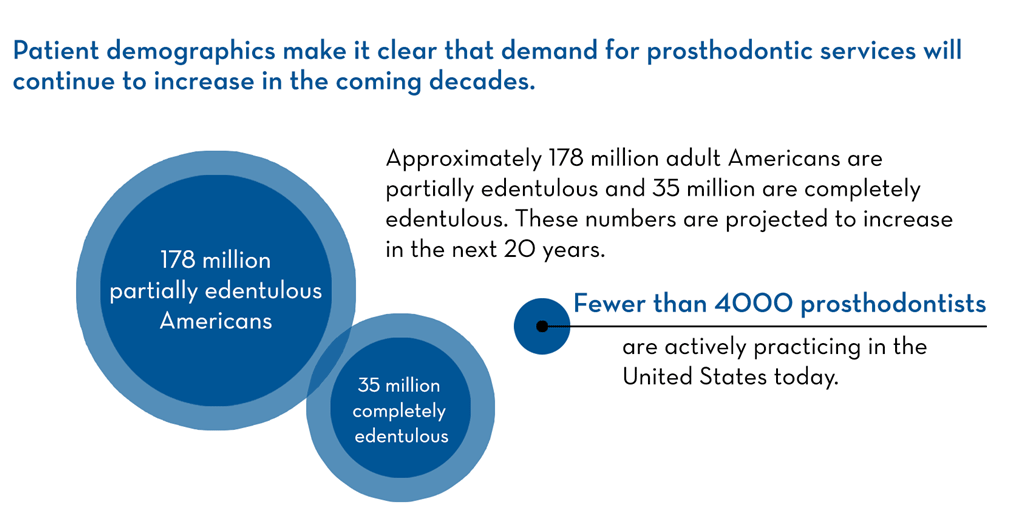Prosthodontists consistently make lists of America’s highest paying occupations, earning the tenth highest salary among all U.S. careers according to the Bureau of Labor Statistics. Moreover, media coverage often lists prosthodontics as a high income job, with the potential to earn an average of more than $169,000 annually.
Prosthodontics is at the heart of dental practice, education, and scientific research. Prosthodontics offers a rewarding and attractive career with unlimited opportunities. There are several paths that can be explored in the specialty, each offering its own unique benefits. Career opportunities involve teaching, patient care, research, administration, and more. These opportunities can quickly elevate you into positions of national prominence. There is opportunity for travel, personal development, and national or international compensated lecturing.

Share this flyer with dental students who are looking into specializing in prosthodontics. This flyer is great to share in school presentations or Lunch and Learns. Also available is a video version of the flyer, which you can show during lectures or in a webinar.
Need another great video for a Lunch and Learn? The ACP Resident Committee led by Dr. Roberta Wright put together this video about some common questions asked about residency programs in prosthodontics. Many thanks to Drs. Roberta Wright and Tyler Thomas for putting this video together! Check it out!
Prosthodontic Career Considerations
Dental schools train their graduates to restore single teeth with crowns, or to replace missing teeth with short-span fixed or removable partial dentures. Implant training is often limited to simple implant restorations. In a postdoctoral prosthodontic program, students learn to treat patients with advanced dental needs. Prosthodontists serve as the architect of the dental treatment plan and are able to collaborate with other dental specialists, general dentists, and other health professionals to develop predictable solutions for the patient’s dental and oral health needs.
Improving Smiles
Studies show that many people are unhappy about the look of their smile, with 25 percent of Americans saying their smile and/or teeth is the one facial feature they would change to boost their self-esteem. The advanced specialty training that prosthodontists receive makes them experts in improving appearances by restoring broken, discolored, mal-positioned, and/or misshapen teeth. A better smile and improved oral function can greatly improve a person’s self-image and quality of life.
Focused on managing and providing the highest quality of patient care outcomes, prosthodontists assist patients with:
-
Dental implant care - simple to the most complex
-
Restoration and replacement of missing teeth
-
Tooth wear and/or attrition
-
Full mouth reconstruction
-
Loss of vertical dimension
-
Comprehensive treatment planning in multi-specialty areas
-
Knowledge and application of emerging clinical science and technologies
-
Congenital, acquired, or trauma-induced oral defects
-
Loss of bone and/or soft tissues
-
Diagnosis and treatment of Temporomandibular Joint (TMJ) disorders
-
Problems with snoring or sleep disorders
-
Assessing existing tooth position and contour
-
Color analysis/selection
-
Esthetic tooth anatomy/contouring
-
Esthetic dental materials selection
-
Tooth bleaching, bonded veneers, and esthetic ceramic inlays, onlays, or crowns for single teeth
-
And more...
Prosthodontists receive advanced training to utilize these techniques in simple and complicated multi-specialty treatment plans. Prosthodonists take great care and pride in using their advanced training and knowledge of materials technology to provide their patients with the ultimate in esthetically attractive and natural-looking restorations.
Replacing Lost Teeth
 The completely edentulous individual is perhaps the most severely debilitated patient of all, having lost all of their teeth, significant amounts of underlying bone, and personal self-confidence. Most dental schools provide a sufficient number of denture patients to adequately train graduating dentists in how to treat simple Class I and II denture patients, while others have made complete dentures an elective course or eliminated it from the curriculum altogether. Prosthodontists receive the necessary training to treat the advanced denture patient (including Class III and IV.) Prosthodontists have the knowledge to evaluate all relevant factors needed to treat patients requiring an advanced level of care.
The completely edentulous individual is perhaps the most severely debilitated patient of all, having lost all of their teeth, significant amounts of underlying bone, and personal self-confidence. Most dental schools provide a sufficient number of denture patients to adequately train graduating dentists in how to treat simple Class I and II denture patients, while others have made complete dentures an elective course or eliminated it from the curriculum altogether. Prosthodontists receive the necessary training to treat the advanced denture patient (including Class III and IV.) Prosthodontists have the knowledge to evaluate all relevant factors needed to treat patients requiring an advanced level of care.
Dental Implants
About 73 percent of Americans say that they would feel self-conscious if they lost even one tooth. All prosthodontic training programs require that their graduates receive training to the proficiency level in restoring several types of dental implants to replace missing teeth.
Prosthodontists are trained to:
-
Serve as the leader in implant diagnosis and treatment.
-
Determine where the teeth need to be positioned at the completion of treatment.
-
Restore the implants that are placed in unfavorable positions.
Prosthodontic training programs are expanding the experiences in implant surgery to a greater degree. The postdoctoral prosthodontic student will have the opportunity to learn the surgical placement as well as the restoration of dental implants.